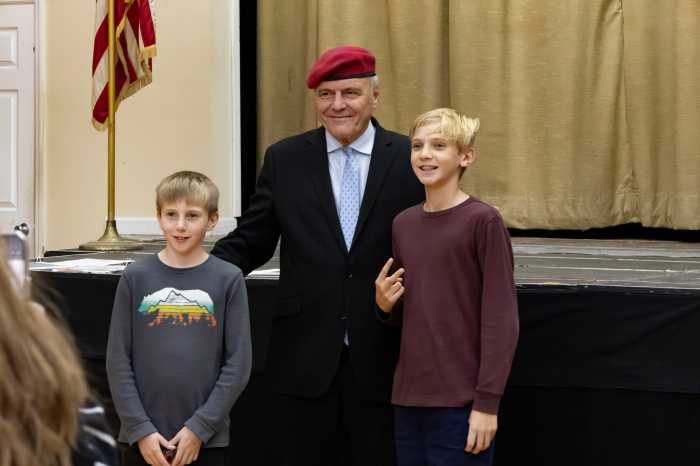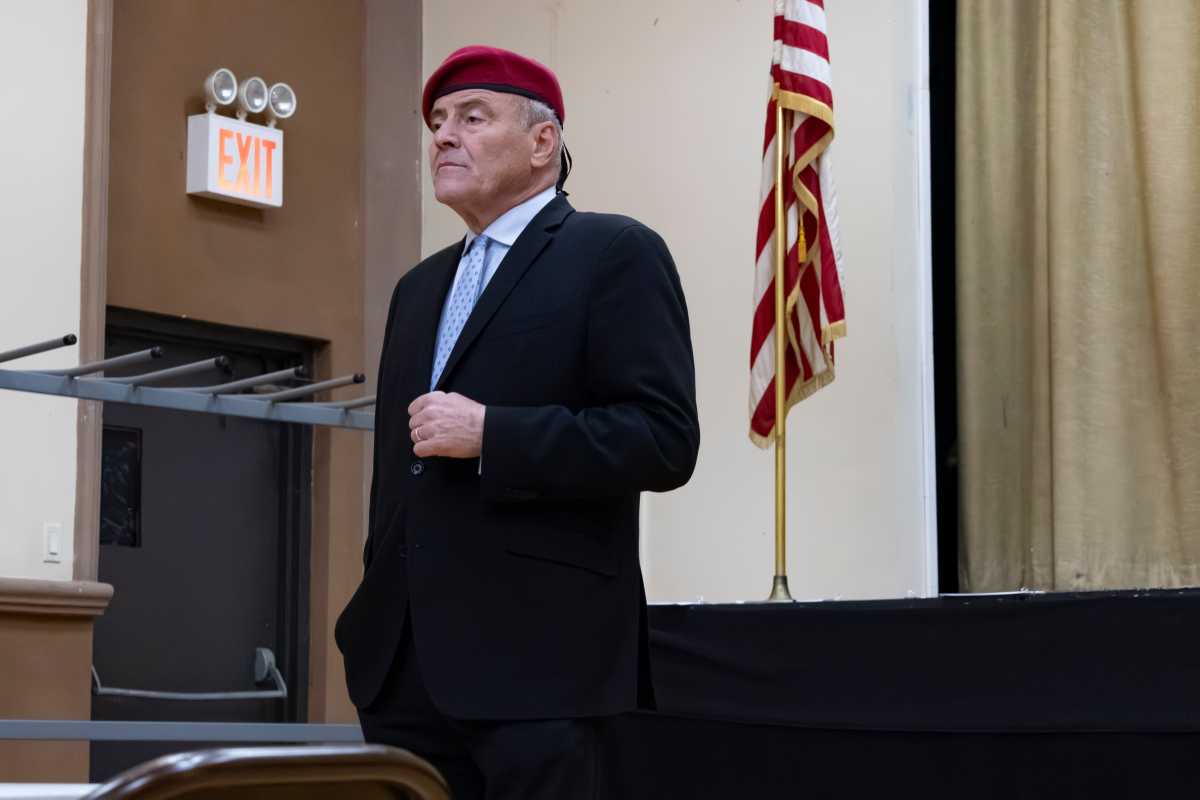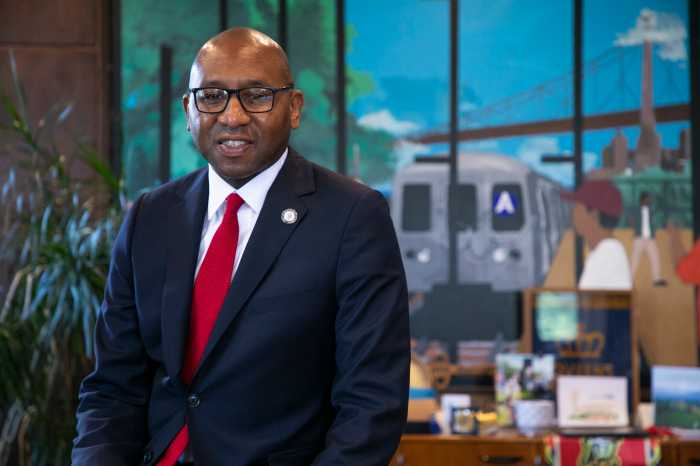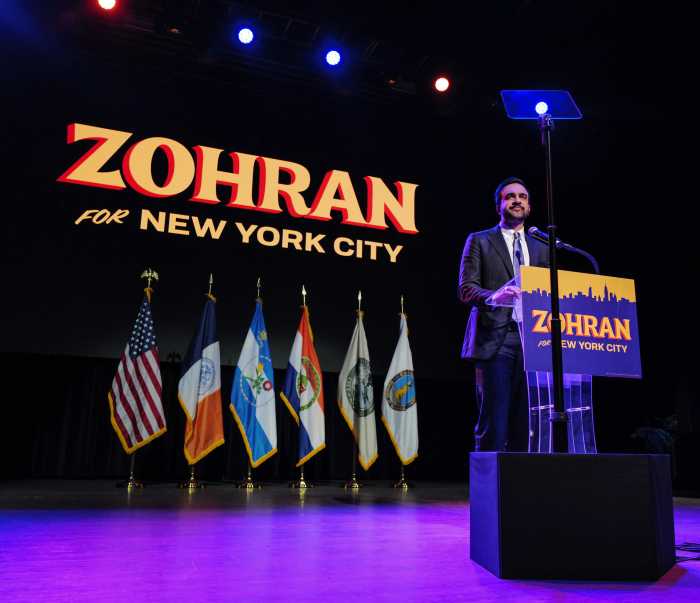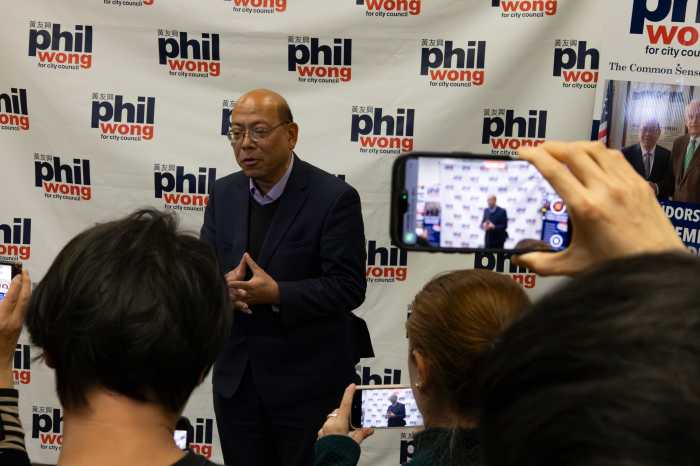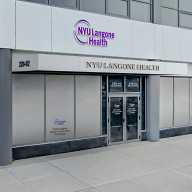Curtis Sliwa visited St. Margaret’s Parish Hall Tuesday night to discuss the mayoral race and answer questions at the Middle Village Resident’s Association (RA). The RA, helmed by community leader Paul Pogozelski, is an “extra layer of civic engagement” to further discuss issues of Queens Community Board 5 and other issues, but also give candidates the chance to speak to constituents.
Other candidates addressed the crowd, including District 30 City Council candidate Alicia Vaichunas, but the highlight of the night was Sliwa, and every head in the room turned when his Guardian Angels beret emerged from the back of the room.

“It’s good to have representatives from different levels of the city government come here,” said Pogozelski. “It shows we’re gaining traction. What’s most important is we had a lot of people come tonight, so the fact these candidates think of us as a viable way to connect with voters and the neighborhood shows we’re becoming a positive civic association.”
The RA invited all the mayoral candidates for the chance to speak with potential constituents. According to an RA representative, Zohran Mamdani declined due to other obligations and Andrew Cuomo’s office did not respond.
Sliwa first related to the crowd, as he lived nearby in Forest Hills with his then-wife Melinda Katz where they raised their two sons until they divorced in 2014. Sliwa took special care to visit St. John’s Cemetery with his children while he lived in Brooklyn, as his grandparents and other family members were buried.
“Every time I come in the vicinity of St. John’s Cemetery… and I know a lot of people who thought I’d end up there” Sliwa said to laughter. “It has a very special meaning in my family. Each of those people had a very important impact in my life.”
The family house in Carnesie, Brooklyn, was inherited by Sliwa, which he turned into the headquarters of the Guardian Angels to help keep the neighborhood he grew up in safe. Sliwa went straight into the issues and his bid for mayor, criticizing Mayor Eric Adams for dropping out of the election and allegedly receiving a $10 million payment. Sliwa also discussed ballot proposals 2-4 which are all dedicated to speeding up the city’s ability to build affordable housing by cutting down on community input.
“It’s the City of Yes on steroids,” Sliwa said. “It means that developers and realtors can come into your residential neighborhoods, and they don’t need to meet with your councilperson or deal with zoning restrictions… and your way of fending it off is at the ballot box.”
Currently, the Uniform Land Use Review Process (ULURP) takes seven months. However, ballot proposals 2 and 3 would not remove input from either the affected community board or borough president, but “expedite” that period of review down to three months. The only proposal that could undercut a community’s wishes is ballot proposal 4, which would give the mayor, city council speaker, and borough president the option to veto a council decision denying an affordable housing project.
Last week, City Comptroller Brad Lander spoke at a similar meeting to discuss the proposals, stating that vote “would not be made lightly” and is meant to better distribute affordable housing projects in across all districts. According to the Department of Housing Preservation and Development (HPD), District 30 built the twelfth least amount affordable housing projects compared to other districts. However, Sliwa disagrees and wants to keep the ULURP process as is, albeit make the process more transparent.
The community discussed a potential lithium ion battery warehouse, proposed by Soltage Energy, in Middle Village, as audience members had health concerns that the “toxic vapors” given off by the batteries potentially affect the nearby Public School 128. The batteries would be used to prevent blackouts and brownouts in the event of severe weather, of which Queens faced 100 electrical outages from 2017-2020.
According to Vaichunas, that location was scrapped in favor of another, but this has yet to be confirmed. A pending lawsuit attributed to a city council decision that allegedly changed zoning allowances for energy systems to allow developers to proceed without further community approval that may halt the warehouse from being built.
Sliwa used the warehouse as an example of what ballot proposals 2-4 could mean for communities. Sliwa also cited the difficult nature of putting out potential electrical fires, as a fire at one such facility in Monterey, CA. forced the evacuation of 1,500 people and lasted several days.
“[These warehouses] are a danger to you, your family, and your friends,” said Sliwa. “You think your property values will remain the same? Nobody’s going to want to move in because it will be near a mini-Chernobyl.”
After speaking, Sliwa thanked Pogozelski and shook hands with Vaichunas, whom he endorsed as a fellow republican. Several members of the audience requested pictures, and wished him luck in the upcoming election.
